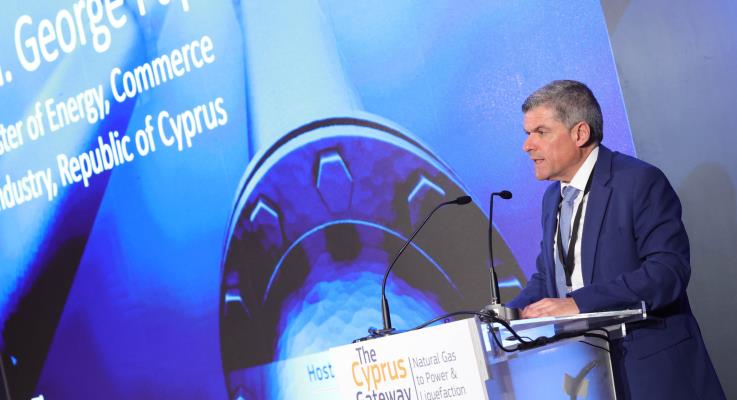The latest drilling, due to have been completed on Sunday, in Exxon Mobil’s Block 10 was successful, Energy Minister George Papanastasiou said on Sunday, adding that results would be announced on Monday.
“Another good field has been found, which will be added to all the natural gas that is located in the EEZ of Cyprus and there are already consultations for synergies between the companies, so that all this can be collected and sent to Egypt for liquefaction and export,” he said, referring to the Pegasus target.
Papanastasiou was speaking at the Nisyros Dialogues, with Vice-President of the European Socialists and Democrats (S&D) Yannis Maniatis, MEP and former Minister of Environment, Energy and Climate Change.
Reference was also made to the Turkish-Libyan memorandum as well as to the electricity interconnection between Cyprus and Greece.
The Cyprus minister announced a decision by the Cyprus Regulatory Authority to cover outstanding financial issues regarding the Great Sea Interconnector (GSI) cable that will link Israel, Cyprus and Greece.
Greece and Cyprus must form a common front before the EU, against Turkish provocations such as the Turkish-Libyan memorandum or the pending Turkish-Syrian memorandum, he continued.
Speaking about the island’s energy sector, he said it is based on three pillars.
The first, he said, is to create an environment in Cyprus that makes electricity economically viable for the Cypriot citizen, to create an environment of stability in the region to develop the hydrocarbons located in the EEZ of Cyprus and at the same time not to be the last EU member state that is remains unconnected.
“Because Cyprus is an island that does not have military capabilities, it relies more on the capabilities that Greece has and at the same time it relies on the economic alliances it has with giants that can get the support of large countries in their own economic way so that we can proceed with the hydrocarbon programme.”
Describing the geopolitical data of the region, he pointed out that Cyprus is in an area where there are challenges.
“The truth is that it takes a lot of courage and caution to be able to move forward, especially when there is a country to the north that is by nature hostile to the interests of Cyprus and by extension Greece,” he said.
The island’s energy programme, he said relies on the gravity of companies such as Exxon Mobil, ENI, Total, Chevron and Shell.
“All of them are in the Cypriot EEZ. So we are developing this wealth through companies that have the gravity to be able to send natural gas for liquefaction, for example to Egypt,” he said.
Maniatis, referring to the possibility of a Turkish-Syrian memorandum on EEZs, on the model of the Turkish-Libyan memorandum, stressed that the EU must take action so that issues such as these are not allowed to be only Greek-Turkish disputes or Cypriot-Turkish disputes and become Euro-Turkish disputes.
He also raised the question of the withdrawal of European funding to Syria in the case the conclusion of this agreement proceeds. “Here we have a strategy that must be developed by both the Greek and Cypriot governments. We in the European Parliament are doing what we can do.”
“We cannot constantly disburse to this country, at a time when it creates serious geopolitical problems for two member states. This should be obvious and should be demanded by both member states,” Papanastasiou said.
Referring to the GSI, Papanastasiou said “this project is neither Cypriot nor Greek, it is European and we expect Europe to stop being silent.”
In the coming days, he said Cyprus will take a decision to allow the disbursement of the amounts it has promised, i.e. €25 million per year for five years while this project is under construction, with a ceiling of €125 million.






Click here to change your cookie preferences